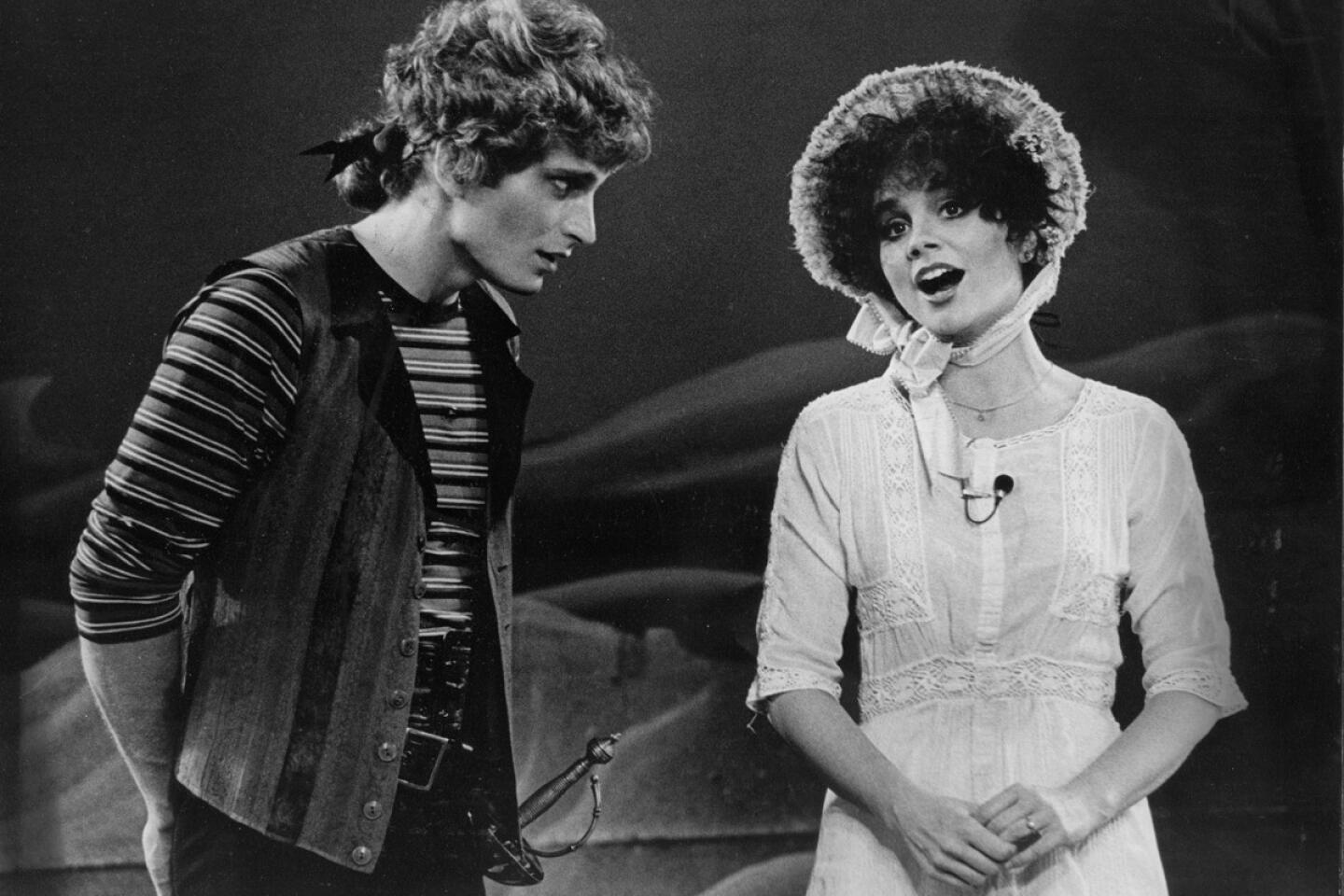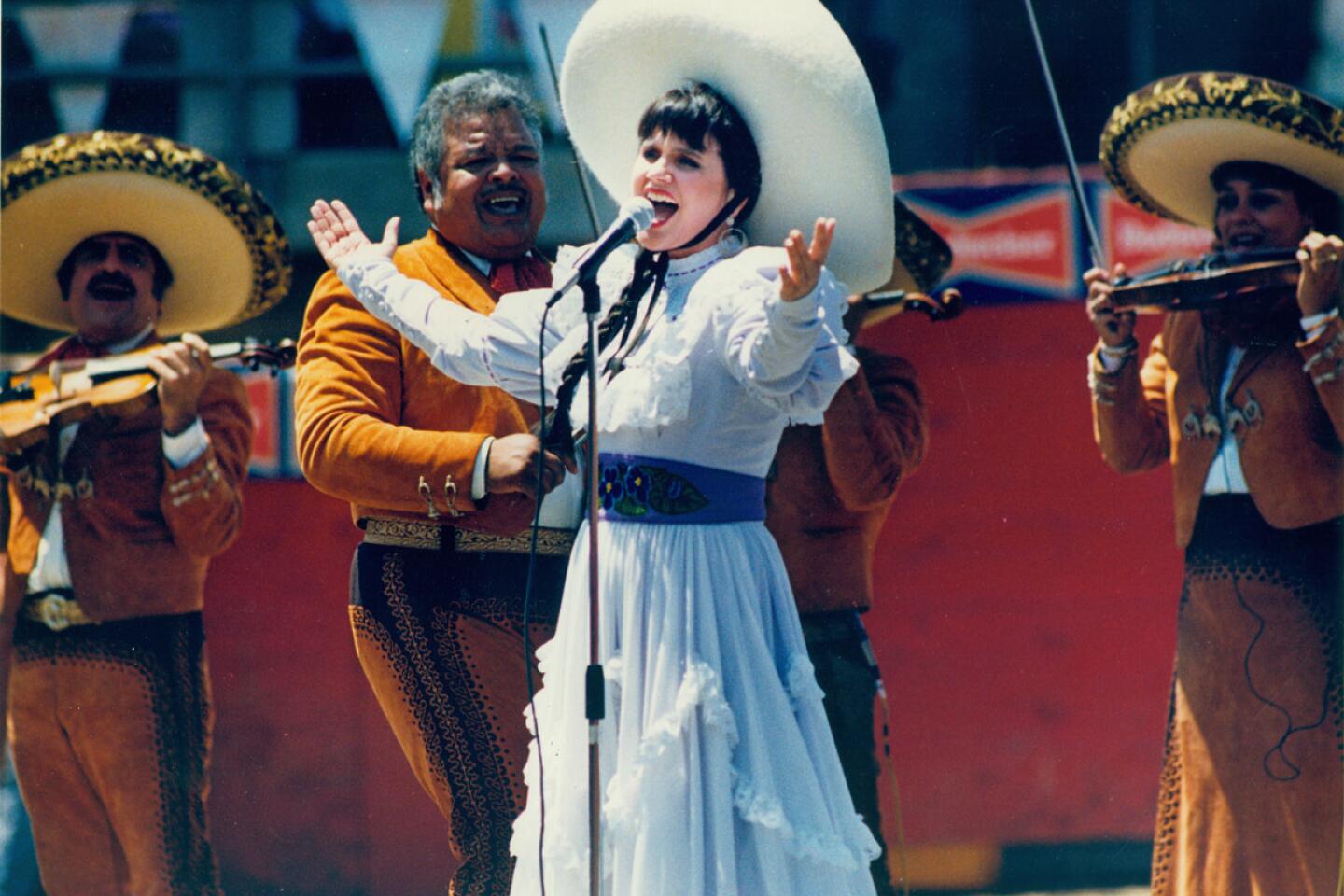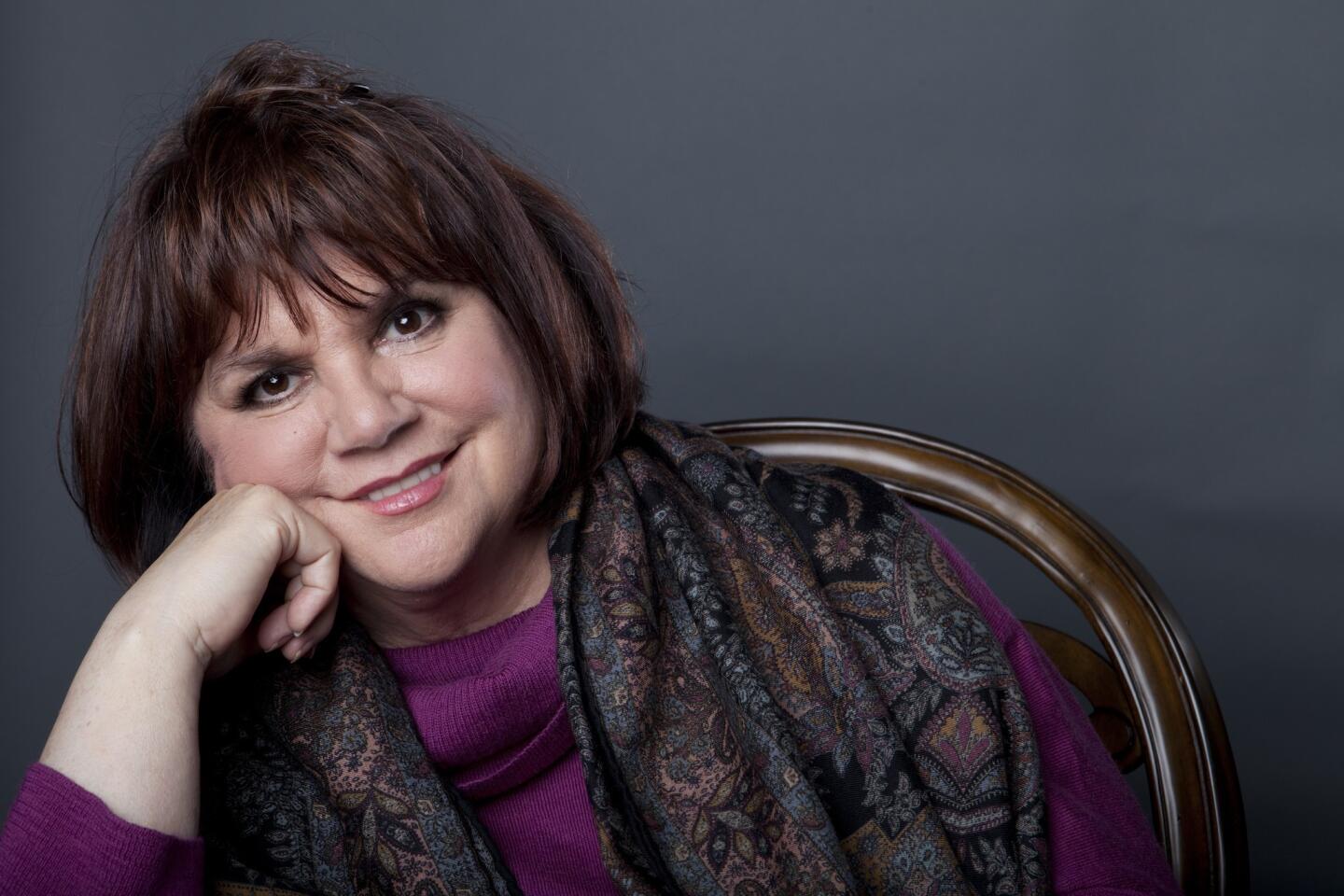Linda Ronstadt lifts her voice to life’s challenges, ‘Simple Dreams’
- Share via
One of the most touching anecdotes in Linda Ronstadt’s new memoir, “Simple Dreams,” comes in the moment she told her parents she was skipping out on college to pursue a career in music.
“My parents were upset and tried to talk me out of it,” she writes in the book, published Sept. 17. “When it became apparent that they couldn’t change my mind, my father went into the other room and returned with the Martin acoustic guitar that his father had bought in 1898.
“When my father began singing as a young man, my grandfather had given him the instrument and said, ‘Ahora que tienes guitarra, nunca tendrás hambre.’ (‘Now that you own a guitar, you will never be hungry.’) My father handed me the guitar with the same words. Then he took out his wallet and handed me thirty dollars. I made it last a month.”
PHOTOS: Linda Ronstadt | Career in pictures
Her grandfather’s words were prophetic, setting the stage for a career that’s stretched across five decades and more than 30 albums. Thanks to her unparalleled voice, Ronstadt became one of the most successful and emotive rock and pop singers of the 1970s, not to mention the only artist ever who’s earned Grammy Awards in country, pop, Mexican American and Tropical Latin categories.
But in August, Ronstadt, 67, revealed that she wouldn’t be singing anymore because of the effects of Parkinson’s disease.
“It happened gradually,” she said in an interview recently with an almost matter-of-fact tone about losing her ability to sing. “I was struggling for so long, at some point it was a relief [to get the diagnosis and] not to have to struggle anymore. What happens with Parkinson’s is that in the brain there’s faulty wiring, like the communication cables are broken. My vocal cords weren’t getting the message.
“Singing is extremely difficult. There are a huge number of little vibrations that have to be coordinated in an exclusive way to produce a sound, to color, to shape, to make an emotion, and you don’t do it on a conscious level. The muscles have to respond to infinitesimally subtle thoughts, whims and energy. Now I have a hard time calling my cat,” she said with a laugh.
VIDEO: Linda Ronstadt’s most memorable songs
Yet in person Ronstadt navigates the twists and turns of an open-ended conversation like an Olympic slalom champion, deftly swooshing from one subject to the next with informed and passionate positions, whether it’s her belief in the importance of exposing children to music early to immigration policy, the dangers of media ownership being concentrated in fewer and fewer hands or what she sees as the rapid deterioration of the nation’s cultural well-being.
Parkinson’s is making it a chore for her to walk from her Beverly Hills hotel room to the downstairs restaurant for a bite (she routinely carries a pair of ski poles with her to get around). She was in Los Angeles from her Bay Area home on a three-week, eight-city book tour in support of “Simple Dreams” (Simon & Schuster, $26), which carries the subtitle “A Musical Memoir.”
“I’ve been spending some time with David Hidalgo,” she said, referencing the singer, guitarist and songwriter of L.A.’s venerated rock band Los Lobos. “I’d always wanted to sing with him, and I finally did,” she said shortly after easing herself into one of the restaurant’s booths. She leaned against a large pillow to help ease her back pain. “We talked about doing a duet album, but my voice had already started to go. I couldn’t do it, and that makes me furious.”
PHOTOS: Unexpected musical collaborations
There’s little bitterness, however, evident in her amenable demeanor. She smiles easily and laughs frequently, yet her longtime friend, producer and manager, John Boylan, says the book tour “is harder than any rock tour I’ve done over the last 40 years. It’s very hard on her.”
But when addressing the effects of Parkinson’s (which she’s convinced she’s been struggling with for years even though she got a confirmed diagnosis only a few months ago), Ronstadt does so dispassionately and with humor. It’s as if she’s channeling what she witnessed as a child when her mother’s back was broken in a car accident. Ronstadt recalls in her book that it wasn’t until the following morning, when her mother collapsed in their kitchen, that the family realized she’d been terribly injured.
“She stayed calm, so I wasn’t aware that anything was particularly wrong,” writes Ronstadt, who has two grown children of her own. “My father was helping her, and he was pretty calm, too.”
She displayed the same sense of calm last week during a public question-and-answer session and book signing in Santa Monica. Ronstadt couldn’t immediately conjure the name of someone she was telling a story about, quickly dismissing it with a laugh as “Another Parkinson’s moment!”
“Simple Dreams” recounts a career propelled by more than Ronstadt’s voice. It takes readers on an engaging journey from her beginnings as part of a large, extended Mexican American family in Tucson through the Los Angeles music scene of the 1960s to the heights of her music stardom in the ‘70s and ‘80s.
The former pop star and sex symbol touches on her relationships with Gov. Jerry Brown (during his first stint in office), filmmaker George Lucas, singer-songwriter John David Souther and journalist Pete Hamill.
The stories are hardly salacious. Instead, she shares a wry anecdote about Brown’s celebrated frugality: On their way to visit singer Rosemary Clooney, Brown commandeered a bunch of roses sent to Ronstadt by a fan and repurposed them as a gift to Clooney.
But most compelling are her musings about the music she loves. In the book, she recalls a time in high school when friends were raving about a new band, the Byrds. “[They] were playing folk rock, a new hybrid taking hold on the West Coast…. As soon as I heard their creamy harmonies, I was mesmerized. It was clear to me that music was happening on a whole different level in Los Angeles. I began making plans to move to L.A. at the end of the spring semester.”
The world would first hear the L.A.-based Ronstadt as lead singer of the Stone Poneys. “Different Drum,” their 1967 hit, was written by Monkees member Mike Nesmith. The group released three albums before Ronstadt’s status as the band’s breakout star was cemented with the 1969 release of her solo debut, “Hand Sown … Home Grown.”
She charted several more minor hits over the next five years, most of them walking the line between country and rock. The backup band she assembled to accompany her on tour soon launched a career of its own as the Eagles.
PHOTOS: Iconic rock guitars and their owners
But it was her recording of the McGarrigle Sisters’ “Heart Like a Wheel” that became the title track of Ronstadt’s 1974 breakthrough album, her first of three albums to reach No. 1 on the Billboard 200 national sales chart.
It catapulted her into the top ranks of pop-rock singers, helping her become one of the five most successful female artists of the 1970s in terms of chart performance. Ronstadt had other big hits with covers of energetic rock and R&B songs such as Buddy Holly’s “It’s So Easy” and “That’ll Be the Day” and Martha & the Vandellas’ “Heat Wave,” but she says she was never exclusively committed to those genres.
“I never felt that rock ‘n’ roll defined me,” she said. “There was an unyielding attitude that came with the music that involved being confrontational, dismissive and aggressive — or, as my mother would say, ungracious. …
“I cringe when I think of some of the times I was less than gracious. It wasn’t how I was brought up, and I didn’t wear the attitude well. Being considered, for a period in the ‘70s, as the Queen of Rock made me uneasy, as my musical devotions often lay elsewhere.”
Byrds founding member Chris Hillman recalls meeting Ronstadt at the Troubadour in West Hollywood, one of the focal points of the folk-rock scene in the ‘60s and ‘70s. “She’s one of the few pop artists who could make a country album with Dolly [Parton] and Emmylou [Harris], then do standards with Nelson Riddle and in between throw in the mariachi songs,” said Hillman, 68. “She knew the music, and she could sing.”
Ronstadt’s heart has always been with the big ballads of love, heartache and remorse that she learned to love as a child. Not surprisingly, it’s the liberating spirit within those songs that guides her today.
“Mexican music opened the doors to everything: classical music, jazz and passion,” Ronstadt said. “From that I learned how to sing in a joyous way about terrible sorrow. It taught me what joy is.
“Joy is a transcendent state, and I learned that from Mexican music. Joy isn’t happiness, it’s transcending the horrific.”
Twitter: @RandyLewis2
More to Read
The biggest entertainment stories
Get our big stories about Hollywood, film, television, music, arts, culture and more right in your inbox as soon as they publish.
You may occasionally receive promotional content from the Los Angeles Times.














